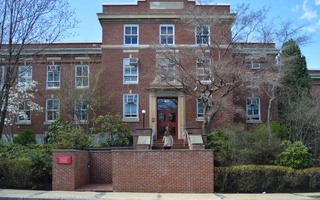The Press does not always guess right about sales appeal. A former Wellesley instructor submitted a biographical manuscript to which she had devoted 20 years. Four big commercial publishers had already turned it down. The Press accepted it but expected few sales.
The book, Any Kelly's "Eleanor of Acquitaine," has been on the best-sellers list of the New York Times and New York Herald Tribune Sunday book sections for several months.
Although most of the more than 2,000 books the Press has published since its beginning were written by faculty members. Harvard professors are under no obligation to submit their works to the Press.
51 on Staff
A number of the good books by the faculty do go to outside publishers. The Press dooms this only natural but with its extensive facilities, the Press tries to lure the good books of the faculty. The Press boasts of a 51-person staff of editors, designers, account managers, advertising and promotion personnel, and sales executives.
Printing is bought by the Press from many different houses on the basis of the best offer. The University Printing Office does about one-third of the jobs. But books are even printed abroad where economies and better quality because of language difficulties can be secured.
Right now a Danish company in Copenhagen is handling "Problems in Monopolistic Competition" by Hans Bremes.
Charles Livingston, a Bowdoin professor of French, has written a book in 13th century French called "Le Jongleur Gautier le Leu." He is presently in Macon, France supervising its production for the Press.
Swamped with Manuscripts
Getting manuscripts to publish is really no problem for the Press. Since it is one of only two university presses in Now England, it is swamped by the writings of scholars who have no university press of their own.
As one of the few university presses and financed by state funds and not purely regional in character, the Press is looked to by scholars all over the country whose work has no local significance.
It is not surprising that authors looking for the Press offices often go to the wrong building. The location has changed three times since the Press was formally established in 1913.
The University Printing Office gave birth to the Press in Randall Hall, located on the corner of Divinity Avenue and Kirkland Street.
At first the Press had only editorial responsibilities. Gradually, though, it absorbed the job of distributing its own books from commercial publishers.
C. Chester Lane '04 came from Ginn and Company to guide the Press as its first director. He got the University Press going and then left to serve in the Army in 1919. His present post is business manager of the New York Times.
Read more in News
Cambridge Police Okay Square Football RalliesRecommended Articles
-
Publish Popular Or PerishThe halcyon days of academic publishing, if they ever existed, are now days of serious-minded business. More than ever, the
-
Harvard Press Was Told Of Book's CIA BackingThe director of the Harvard University Press, which published a book by Nadav Safran without mention of its CIA sponsorship,
-
A HARVARD UNIVERSITY PRESS.The need for a non-commercial printing press in the United States is widely felt and acknowledged. Many valuable writings by
-
Wilson to Take Over University Press This July; Succeeds ScaifeThomas J. Wilson will assume directorship of the University Press beginning July 1, the University announced last night. He succeeds
-
 Printing in the Digital Age
Printing in the Digital Age













